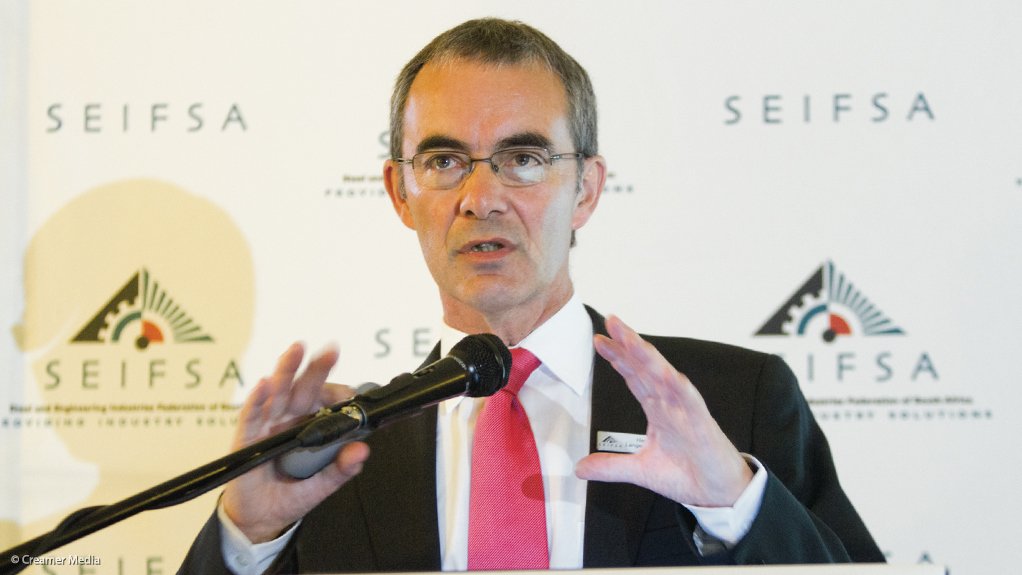Lack of planning to address slow economic growth worrying – Seifsa
The Steel and Engineering Industries Federation of Southern Africa (Seifsa) has welcomed government’s announced efforts to reduce its expenditure; however, the organisation remained concerned about the lack of concrete plans to address the country’s slow economic growth.
Speaking a day after Finance Minister Pravin Gordhan’s 2016 Budget Speech, Seifsa chief economist Henk Langenhoven said the Budget indicated that the primary balance of current expenditure versus income would be positive from this Budget period onwards.
During his Budget Speech, Gordhan said government would cut the spending ceiling over the medium-term expenditure framework period, cut consumables such as travel and vehicle purchases, restrict the filling of expensive vacancies and reduce headcount through better personnel practices, as well as contain spending by cutting R25-billion off the State’s R500-billion a year procurement spend and investigate all contracts with a value of R10-million and higher.
“These are welcome but high targets to meet. If achieved, this budget may indicate a turning point,” Langenhoven averred.
He added that it seemed clear that provinces and local authorities had reached their peak in terms of headcount and drag on the fiscus, with no increases in spending allocations and strong indications from the National Treasury that they would have to consolidate.
The Manufacturing Circle, meanwhile, also commended Gordhan for his emphasis on fiscal consolidation and discipline to reduce the budget deficit and stabilise the country’s debt to gross domestic product ratio, as well as measures aimed at reducing government’s expenditure.
However, Langenhoven said, notwithstanding government’s plans to significantly cut its expenditure, Gordhan’s speech lacked solid measures to improve domestic demand.
“In light of the very soft and hugely competitive international trade environment, one of the best stimulatory measures within the government’s control would be to channel spending to local producers,” he said.
Initiatives to support growth and development, such as building on the success of the Renewable Energy Independent Power Producer Procurement Programme, fostering agroprocessing and streamlining trade flows, were commendable, said Langenhoven, but added that there was not much mention of stimulating the local economy through allocating spending to local producers.
The Manufacturing Circle stated that, while it applauded the move to have funding from the Industrial Development Corporation made available to boost local manufacturing and beneficiation, the organisation would have “liked to see more detail on how incentives will be strengthened or made more flexible” to achieve these goals.
“In particular, no mention was made of the preservation of existing incentives such as those for the automotive and clothing, textiles and footwear sectors, [which] are important measures in boosting inclusive growth,” it added.
Meanwhile, steel producer ArcelorMittal South Africa stated in a media release that it was pleased with government’s infrastructure investment plans, which included energy, transport and logistics projects.
It also commended Gordhan’s emphasis on improving fiscal discipline and creating policy certainty.
Meanwhile, commenting on the extent to which the Minister’s speech reestablished general confidence in government and the country, Langenhoven highlighted that Gordhan struggled to find any signs of confidence returning in terms of positive economic data.
He said studies showed that the perceived positive impact of a weak currency on competitiveness and exports was not well founded and that the decline in the terms of trade was further evidence of that.
However, the announcement of measures to enhance fiscal probity in the face of severe pressures for expanded involvement of government either as a direct employer or through spending increases contributed to confidence building.
Langenhoven stated that the Budget had achieved much, despite the many uncertainties. “More needs to be done to change course on complementary policies that are inhibiting growth and investment. World economic recovery will happen, but whether South Africa will be part of such a recovery rests a great deal on its own efforts,” he concluded.
Article Enquiry
Email Article
Save Article
Feedback
To advertise email advertising@creamermedia.co.za or click here
Press Office
Announcements
What's On
Subscribe to improve your user experience...
Option 1 (equivalent of R125 a month):
Receive a weekly copy of Creamer Media's Engineering News & Mining Weekly magazine
(print copy for those in South Africa and e-magazine for those outside of South Africa)
Receive daily email newsletters
Access to full search results
Access archive of magazine back copies
Access to Projects in Progress
Access to ONE Research Report of your choice in PDF format
Option 2 (equivalent of R375 a month):
All benefits from Option 1
PLUS
Access to Creamer Media's Research Channel Africa for ALL Research Reports, in PDF format, on various industrial and mining sectors
including Electricity; Water; Energy Transition; Hydrogen; Roads, Rail and Ports; Coal; Gold; Platinum; Battery Metals; etc.
Already a subscriber?
Forgotten your password?
Receive weekly copy of Creamer Media's Engineering News & Mining Weekly magazine (print copy for those in South Africa and e-magazine for those outside of South Africa)
➕
Recieve daily email newsletters
➕
Access to full search results
➕
Access archive of magazine back copies
➕
Access to Projects in Progress
➕
Access to ONE Research Report of your choice in PDF format
RESEARCH CHANNEL AFRICA
R4500 (equivalent of R375 a month)
SUBSCRIBEAll benefits from Option 1
➕
Access to Creamer Media's Research Channel Africa for ALL Research Reports on various industrial and mining sectors, in PDF format, including on:
Electricity
➕
Water
➕
Energy Transition
➕
Hydrogen
➕
Roads, Rail and Ports
➕
Coal
➕
Gold
➕
Platinum
➕
Battery Metals
➕
etc.
Receive all benefits from Option 1 or Option 2 delivered to numerous people at your company
➕
Multiple User names and Passwords for simultaneous log-ins
➕
Intranet integration access to all in your organisation


















